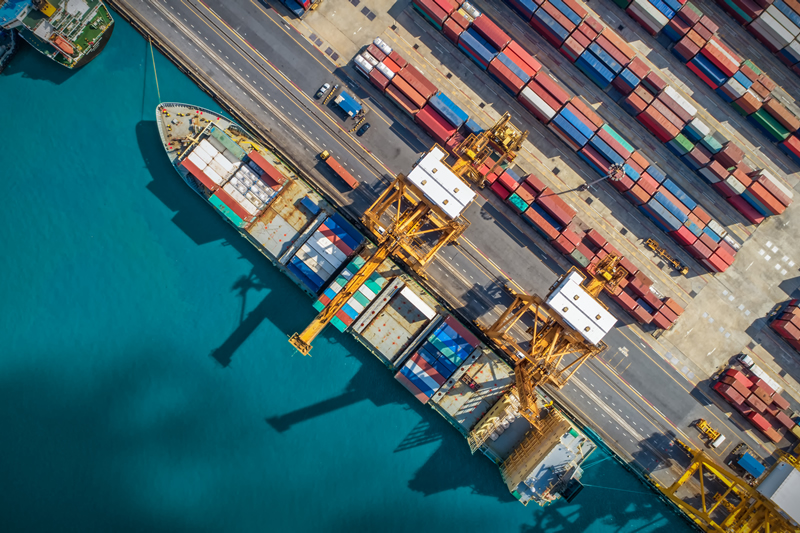Shipping Emissions Reduced Using Shore To Ship Power Systems
12
The European Union is on an inspirational journey advocating for the integration of shore-to-ship power systems within the shipping and maritime sector. With a resolute commitment to a more eco-friendly and sustainable future, the EU has taken definitive measures to counter the adverse impacts of greenhouse gas emissions. Drawing inspiration from the momentous Paris Agreement, the EU has established ambitious targets to curtail carbon emissions, initiating a transformative odyssey across various domains.

Acknowledging the environmental challenges posed by sea vessels during their port sojourns, the EU recognises the detrimental effects of conventional diesel generators. In response, the EU has taken a leading role in promoting widespread implementation of shore-to-ship power systems, revolutionizing port operations and heralding a new era of sustainability.
The EU actively champions ecologically responsible solutions, ranging from promoting electric vehicle usage on land to revolutionising the maritime field. By placing pollution reduction at the forefront and embracing inventive strategies, the EU has embarked on a remarkable path that champions the adoption of shore-to-ship power systems in the maritime realm.
These cutting-edge systems facilitate vessels in seamlessly discontinuing their diesel generators upon docking, transitioning to electricity sourced from the port's power infrastructure. This ingenious approach not only eradicates harmful emissions but also substantially diminishes noise and vibrations in port vicinities, providing tangible advantages to nearby communities and marine ecosystems.
By enabling ships to connect to cleaner power sources during their stationary phases, the EU actively mitigates the environmental impact of the maritime sector, converting ports into thriving hubs of sustainability and advancement. The European Union has established ambitious targets through its Climate Law, aiming for a minimum 55% reduction in greenhouse gas emissions by 2030, with the ultimate objective of achieving climate neutrality by 2050. Within the maritime domain, around 6% to 7% of CO2 emissions arise during port stays within the European Economic Area.
This underscores the imperative to strongly promote sustainability in shipping and ensure that port services adopt eco-conscious practices while also establishing infrastructure for alternative fuels. Simultaneously, it's pivotal for key maritime and inland ports located along the trans-European transport network (TEN-T) to adapt to their critical role as strategic multimodal nodes and hubs for clean energy.
The Norwegian government stands out as a pioneer in shore-to-ship power systems, exemplified by the creation of the Green Shipping Program. A visionary initiative placing significant emphasis on the indispensable role of shore-to-ship power in achieving emission reduction goals. This program is dedicated to fostering the advancement and adoption of sustainable maritime solutions, with a specific focus on the development and integration of shore power infrastructure. By prioritising this innovative technology, the program strives to contribute to a more verdant and environmentally conscious future for the shipping industry.
The need to demonstrate environmental responsibility is key for today’s marine and offshore industries. Charterers and the public demand high standards of performance and reliability. Fuels and exhaust gas emissions are also the subject of international, regional and national controls.Protea is at the forefront of shipping emissions management, control and reduction. We have a full section on our website dedicated to shipping and marine emissions at https://www.protea.ltd.uk/marine.
#protea #emissions #monitoring #cems #ftir #gas #analysers #shipping #marine
Other Articles
Carbon Capture Utilisation & Storage (CCUS) In 2026
16
Global Underground CO2 Storage Data Offers Hope Amid Rising Emissions
01
IMO Postpones Adoption Of Global Net-Zero Shipping Framework
04
Pioneering Carbon Capture Projects Ready For Construction
03
Methanol & Ammonia Deemed Ready As Zero-Emission Shipping Fuels
01
Carbon Capture Storage Reaching A Turning Point In Decarbonisation
13
CCS To Capture 15% Of Shipboard Carbon Emissions By 2050
29
Global Shipping Industry Struggles To Navigate Net Zero Transition
21
Carbon Capture Surges as Economics Policy & Industry Demand Align
14
GHG Emissions At Ports On The Rise Despite Initiatives
07
